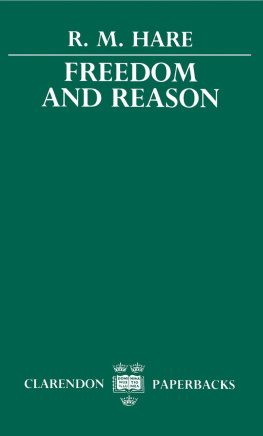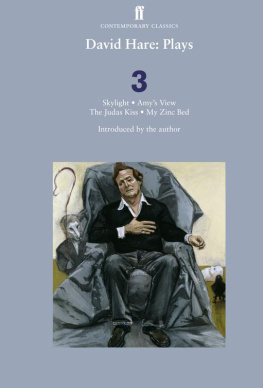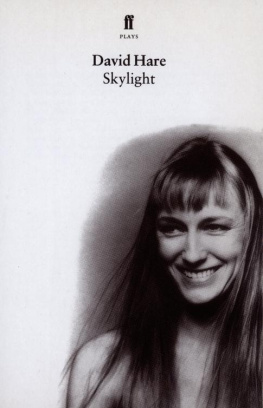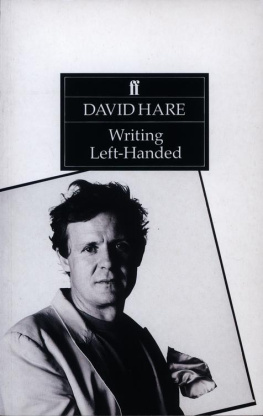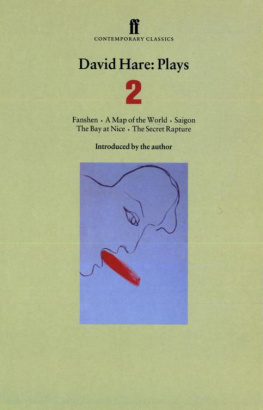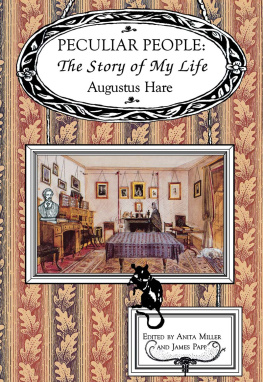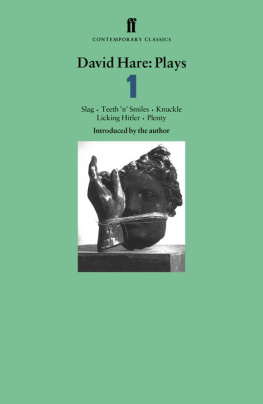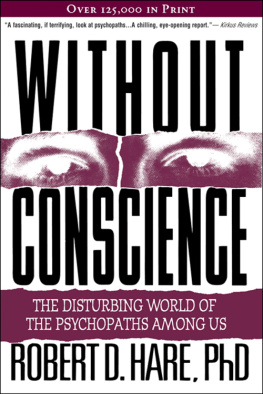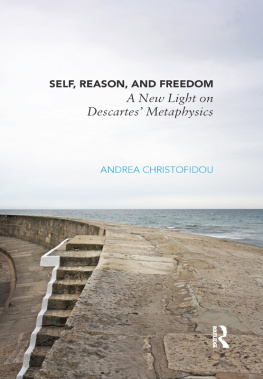Hare - Freedom and Reason
Here you can read online Hare - Freedom and Reason full text of the book (entire story) in english for free. Download pdf and epub, get meaning, cover and reviews about this ebook. City: Oxford, year: 1965, publisher: Oxford University Press, genre: Religion. Description of the work, (preface) as well as reviews are available. Best literature library LitArk.com created for fans of good reading and offers a wide selection of genres:
Romance novel
Science fiction
Adventure
Detective
Science
History
Home and family
Prose
Art
Politics
Computer
Non-fiction
Religion
Business
Children
Humor
Choose a favorite category and find really read worthwhile books. Enjoy immersion in the world of imagination, feel the emotions of the characters or learn something new for yourself, make an fascinating discovery.
- Book:Freedom and Reason
- Author:
- Publisher:Oxford University Press
- Genre:
- Year:1965
- City:Oxford
- Rating:3 / 5
- Favourites:Add to favourites
- Your mark:
- 60
- 1
- 2
- 3
- 4
- 5
Freedom and Reason: summary, description and annotation
We offer to read an annotation, description, summary or preface (depends on what the author of the book "Freedom and Reason" wrote himself). If you haven't found the necessary information about the book — write in the comments, we will try to find it.
Freedom and Reason — read online for free the complete book (whole text) full work
Below is the text of the book, divided by pages. System saving the place of the last page read, allows you to conveniently read the book "Freedom and Reason" online for free, without having to search again every time where you left off. Put a bookmark, and you can go to the page where you finished reading at any time.
Font size:
Interval:
Bookmark:
Freedom and Reason
BY
R. M. Hare


Great Clarendon Street, Oxford OX2 6DP
Oxford University Press is a department of the University of Oxford
It furthers the Universitys objective of excellence in research, scholarship,
and education by publishing worldwide in
Oxford New York
Auckland Bangkok Buenos Aires Cape Town Chennai
Dar es Salaam Delhi Hong Kong Istanbul Karachi Kolkata
Kuala Lumpur Madrid Melbourne Mexico City Mumbai Nairobi
So Paulo Shanghai Taipei Tokyo Toronto
Oxford is a registered trade mark of Oxford University Press
in the UK and in certain other countries
Published in the United States by
Oxford University Press Inc., New York
Oxford University Press 1963
The moral rights of the authors have been asserted
Database right Oxford University Press (maker)
All rights reserved. No part of this publication may be reproduced,
stored in a retrieval system, or transmitted, in any form or by any means,
without the prior permission in writing of Oxford University Press,
or as expressly permitted by law, or under terms agreed with the appropriate
reprographics rights organization. Enquiries concerning reproduction
outside the scope of the above should be sent to the Rights Department,
Oxford University Press, at the address above
You must not circulate this book in any other binding or cover
and you must impose this same condition on any acquirer
ISBN 019881092X
The function of moral philosophyor at any rate the hope with which I study itis that of helping us to think better about moral questions by exposing the logical structure of the language in which this thought is expressed. When I wrote my first book, which was a study of the chief moral words, I had no more than a dim notion of what account of moral reasoning would develop out of this studyonly the conviction that, if it were well done, our understanding of moral questions would be increased. In the years since, this hope has not proved entirely vain; and, although I am still far from clear on many matters, I think it worth while to publish this progress report, if only to enlist the help of others in becoming clearer.
My views have been the subject of a great deal of controversy; but any reader who is looking in this book for a full-scale rebuttal of my critics will be disappointed. I did, indeed, in preparation for writing it, draft about fifty pages of polemical matter in answer to the most widely canvassed objections; but, having thus convinced myself that they could be answered, I came to feel that the answers to them were less exciting than the positive things which I had to say, and possibly of less durable interest; I therefore put them aside, to appear elsewhere. I have profited greatly from these discussions; but I am obstinate enough to believe that, though they have added much to what I thought before, they have not taken much away.
There will be found, therefore, in this book, only passing allusions to these wrangles. Lest they should be thought to be directed at the views of particular people, I must make clear that, in all cases except where names are mentioned, the views referred to are ones which I have heard in discussion, but cannot ascribe to any identifiable person. I must, however, express my thanks to a great many identifiable, but for reasons of space unidentified, people, for the interest which they have shown in my opinions, and for the help they have given me in finding out what objections I have to meet.
Much has been omitted besides polemics, for the same reasons as were given in the preface to my first book. In particular, I have, as before, left two or three palpable loose ends, knowing that any book about moral reasoning is bound to be incomplete wherever it stops. For example, I have devoted only a very short digression to the problem of free will; a whole book would be required to say anything useful about this problem. I have, on similar grounds, contented myself with pointing out certain affinities between my own position and that of the writers of the utilitarian tradition; I have left unanswered many questions which must be asked by anybody who wishes to produce a watertight theory of this sort. Here, as in many other places, I have tried only to provide material for future discussion.
Books and articles are constantly appearing on the subject of moral language and moral thought; and if I may seem to have ignored most of them, I have the excuse that to have attempted to read them all would have put an end to my hopes of writing anything. Those which I have read were picked out more by chance than by any considered policy or assessment of the merits of their authors; I have learnt much from them, and can only ask the forgiveness of those whose work I have neglected. These, I am sure, include many who have criticized me; perhaps they may find, in the positive views here put forward, some defence against their criticisms.
I owe a great debt of thanks to the Council of Humanities of Princeton University for appointing me, in the autumn of 1957, to the fellowship which gave the opportunity to start writing this book under ideal conditions; to my colleagues in the department there for much stimulating discussion; and to my own college, Balliol, for setting me free for that term.
It is written for all who are seriously troubled by moral questions, and dedicated especially to my children. May it be that, through the discussion of the problems of ethics, the world in which they have to live may be one in which these matters are better understood.
R. M. H.
Balliol College
1962
PART I
DESCRIBING AND PRESCRIBING
PART II
MORAL REASONING
PART III
FROM THEORY TO PRACTICE
He to whom thou was sent for ease, being by name Legality, is the son of the Bond-woman how canst thou expect by them to be made free?
BUNYAN, The Pilgrims Progress
I ask the reader to start by supposing that someone (himself perhaps) is faced with a serious moral problemone that calls forth all the powers of thought, imagination, and feeling that a man possesses. He will have to supply his own example; for I cannot say for any one of my readers what moral question has troubled him most. If he cannot think of an example, he will not understand this book, and may as well postpone the reading of it until he has lived a little longer.
I wish to draw attention to two features which any such serious moral problem will have, the combination of which seems to confront us, as philosophers, with a paradox, or even an antinomy. The first is that a man who is faced with such a problem knows that it is his own problem, and that nobody can answer it for him. He may, it is true, ask the advice of other people; and he may also ascertain more facts about the circumstances and consequences of a proposed action, and other facts of this sort. But there will come a time when he does not hope to find out anything else of relevance by factual inquiry, and when he knows that, whatever others may say about the answer to his problem, he has to answer it. If anyone were to suggest that the answer must be such and such, because everybody says soor that, even, he would be abusing the English language if he gave any other answerhe will, if he understands what moral questions are, feel that to accept these suggestions would be to accept a diminution of his own freedom. For one of the most important constituents of our freedom, as moral agents, is the freedom to form our own opinions about moral questions, even if that involves changing our language.
Next pageFont size:
Interval:
Bookmark:
Similar books «Freedom and Reason»
Look at similar books to Freedom and Reason. We have selected literature similar in name and meaning in the hope of providing readers with more options to find new, interesting, not yet read works.
Discussion, reviews of the book Freedom and Reason and just readers' own opinions. Leave your comments, write what you think about the work, its meaning or the main characters. Specify what exactly you liked and what you didn't like, and why you think so.

